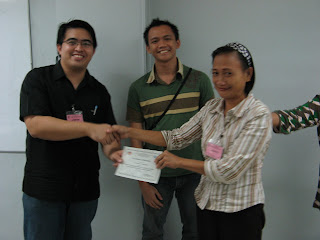During the course of the lecture, Dr Jenkin identified three major problems in creating robots, namely:
- locomotion (how the robot moves)
- sensing (how the robot measures properties of its environment)
- reasoning (how the robot transduces measurements into actions)
* use of wheels
- maximum stair height to be able to climb: less than the radius of the wheel
- ineffective on planet surfaces, especially sand
* use of treads
- involves wheels bound by a belt (much like a construction vehicle)
- can climb and move into tight spaces
* use of legs, fins, or other similar methods
- legged robots are power inefficient and harder to program, but provide dynamic control
He noted that for 'sensing', it is "easy" to collect data, but understanding the data is extremely difficult.
For reasoning, he gave three critical issues:
- situational reasoning
- reactivity [speed of response]
- reasoning about space
- high cost
- dangerous
- remote
Another application for robots is telemining, used in Canada. This greatly reduces the transport cost of personnel from the ground to the mine area meters below and kilometers [horizontally] from the shaft/opening.
One application related to health includes elder care. He noted that nurses often suffer from work-related injuries, mainly caused by wrong posture while trying to lift a patient. However, robots will have to look harmless, otherwise patients will be scared. Also, there are also robots that emit soft, cuddly noises.























